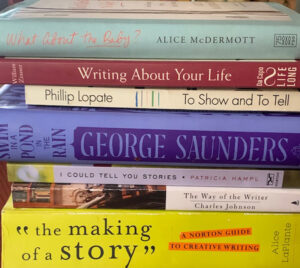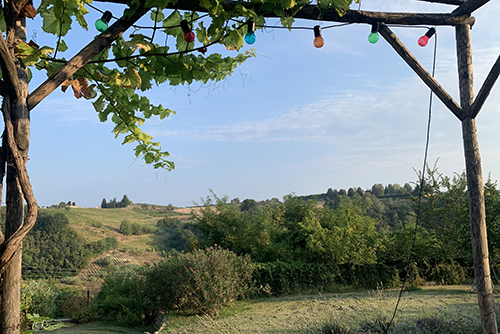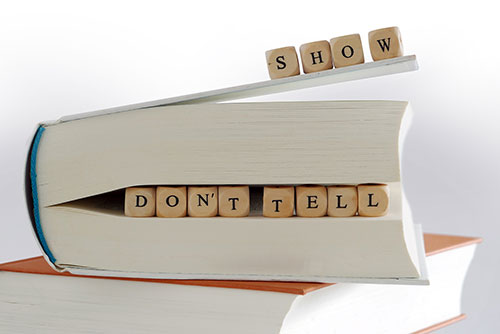 Books on writing are wonderful resources to help with all aspects of writing, from learning the basics to sharpening or updating an old skill. Over the years, I have accumulated many books on the craft of writing that will benefit the novice as well as more accomplished professionals. Some are more practical than philosophical, but they're all valuable, and are all prominently displayed and easily reached on my bookshelves. They inspire me as a writer and editor, and I refer to them often. I think it's important to read what other writers say about the creative process and the hard work of writing.
Books on writing are wonderful resources to help with all aspects of writing, from learning the basics to sharpening or updating an old skill. Over the years, I have accumulated many books on the craft of writing that will benefit the novice as well as more accomplished professionals. Some are more practical than philosophical, but they're all valuable, and are all prominently displayed and easily reached on my bookshelves. They inspire me as a writer and editor, and I refer to them often. I think it's important to read what other writers say about the creative process and the hard work of writing.
Of the many excellent books on the art and craft of writing, here are seven of my favorites.
What About the Baby?: Some Thoughts on the Art of Fiction
Alice McDermott
A collection of 16 thoughtful essays adapted from more than two decades of lectures Alice McDermott gave at the Sewanee Writers' Conference and as professor at Johns Hopkins University. In this, her first work of nonfiction, she provides a wealth of information, from expert advice to lessons learned. “I expect the fiction I read to come back to me — unbidden sometimes, a lovely refrain, apropos of nothing, a pleasure recalled… I expect the fiction I read to make its rereading a necessity.”
To Show and To Tell: The Craft of Literary Nonfiction
Phillip Lopate
Essayist, editor, novelist, poet, and teacher, Phillip Lopate draws on decades of experience to provide a guide to writing and exploring literary nonfiction. In one of his many essays, he answers the question “What is needed to generate nonfiction?” He tells us it's curiosity. “It may sound more tepid than obsession or passion, but it is vastly more dependable in the long run. You follow out a strand of curiosity and pretty soon you've got an interesting digression, a whole chapter, a book proposal.”
Writing About Your Life: A Journey into the Past
William Zinsser
Journalist and nonfiction writer, editor, teacher, and author of the wildly popular On Writing Well (more than 1.5 million copies sold), William Zinsser is an icon whose writing career spans 70 years. In 2010, at the age of 87, he started a weekly blog for the American Scholar that he continued for 15 months. (He died in 2015.) Writing About Your Life provides invaluable advice on memoir writing in particular. “The only pertinent question about any memoir is: Is it a good book or a bad book? If you use memoir to look for your own humanity and the humanity of the people who crossed your life, no matter how much pain they caused you, readers will connect with your journey. What they won't connect with is whining. Dispose of that anger somewhere else.”
A Swim in a Pond in the Rain: In Which Four Russians Give Us a Master Class on Writing, Reading and Life
George Saunders
The prolific George Saunders based this book on his 20-plus years teaching a class on the Russian short story to his MFA students at Syracuse University. Here he guides the reader through seven Russian short stories — by Chekov, Tolstoy, Turgenev, and Gogol — and provides models for ways to think about them. He explains in detail why a story works and gives your critical-thinking skills a workout. He also offers expansive writing advice and exercises. “Fiction helps us remember that everything remains to be seen. It's a sacrament dedicated to this end. We can't always feel as open to the world as we feel at the end of a beautiful story, but feeling that way even briefly reminds us that such a state exists and creates the aspiration in us to strive to be in that state more often.”
I Could Tell You Stories: Sojourns in the Land of Memory
Patricia Hampl
This collection of elegant and inspiring essays by Patricia Hampl, a memoirist, poet, and professor at the University of Minnesota, explores craft, memory and imagination, and life. Some of the essays reflect on the dilemma of writing about people close to her, some she barely knew, and some who no longer speak to her. “I've lost quite a few people along the way. And not to death. I lose them to writing…” She tells us that she writes about her own life because of “the radiance of the past — it draws me back and back to it… It sheds the light of lived life. One who writes memoir wishes to step into that light, not to see one's own face — that is not possible — but to feel the length of shadow cast by the light.”
The Making of a Story: A Norton Guide to Creative Writing
Alice LaPlante
Alice LaPlante, an award-winning writer of fiction and nonfiction and a teacher of writing, gives us a detailed and accessible guide to the basics of creative writing, providing a nuts-and-bolts approach to both fiction and creative nonfiction. Each of the 14 chapters ends with challenging writing exercises and a section on reading as writer that features a story illustrating the chapter's theme.
The Way of the Writer: Reflections on the Art and Craft of Storytelling
Charles Johnson
Charles Johnson, a novelist, essayist, literary scholar, philosopher, cartoonist, screenwriter, and professor who taught and mentored writing students for 33 years at the University of Washington, provides sharp essays on writing, literature, and the writing life. In his essay “Storytelling and the Alpha Narrative,” he says that, in introducing and confronting conflict, the writer chooses a particular moment in a character's life to dramatize “because it is at this moment that the character is living at high stakes.” He also writes, “In the end, the galaxy of techniques and strategies we teachers provide our students — all that theory and practice — must serve spirited, memorable storytelling.”
All these writers would agree on the importance of reading, exposing yourself to other writers' work and their writing style. Read everything—it doesn't matter whether it's a novel or short stories or plays or memoirs or biographies or essays, or history or science books. Read widely and get inspired.
- Should I Fictionalize My Memoir? - June 21, 2024
- Do I Need a Writing Coach? - July 13, 2023
- How to Improve and Inspire Your Writing: 7 Books That Will Pave the Way - April 25, 2022



